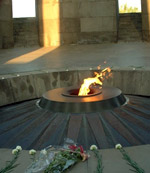During this week in different countries of post-soviet states various events will be held dedicated to the Armenian Genocide of 1915, committed by Ottoman Turks. Besides Armenia, the most remarkable of those events will be held in Russia, Ukraine and Georgia.
A week ago, the youth organizations of Moscow announced that they were going to hold a number of protests on April 24. The announcement reads, “Ninety-two years ago the government of Ottoman Turkey committed a crime against Armenians. In 1915-1923 about 1.5 million peaceful Armenians were violently slaughtered. Besides Armenians, a great number of Greeks, Arabs, Assyrians, Kurds and others were slaughtered. In 1914, a year before the Genocide, there were 2,500 churches in the territory of Western Turkey. After the Genocide only 900 remained, 500 out of which were later destroyed, 250 have become ruins and 200 need to be restored.”
Events dedicated to the 92nd anniversary of the Armenian Genocide were launched in Moscow late in the evening of April 23 in the Holy Cross Church. Representatives of the Armenian Embassy in Moscow, members of Armenian organizations of Moscow and youth organizations laid wreaths at the khatchkar in front of the church. “At 3:00 p.m. representatives of Armenian youth organizations, a total of 500 activists, made way for the Turkish embassy in Moscow.
In Georgia, the Armenian Cooperation Center organized a peaceful torch protest the evening of April 23 outside the Turkish Embassy in Tbilisi to demand that its government acknowledge the genocide of Armenians in the last years of the Ottoman empire. The action was called “Flame of memory and struggle”. Their announcement reads, “On the night of April 24 in Constantinople many representatives of the Armenian intelligentsia were cruelly murdered – more than 800 writers, painters, lawyers, and clergymen. During one night the Armenians of Turkey were deprived of their bright people, their clergymen. After those murders, mass deportations followed and a planned genocide.” The Armenian churches of Georgia will also offer services.
The government of Crimea has allotted three entire days for those sad events – April 21-24. During those days a roundtable, mourning march, and a service were held in the Ukrainian peninsula. “Every single Armenian living in or outside Armenia must not spare efforts to make the world and first of all Turkey recognize this implacable crime,” said Karina Khachanyan, deputy chair of the Armenian Youth Committee of Crimea. According to her, the Supreme Council of Crimea made a decision to dedicate April 24 as a Memorial Day for the victims of Armenian Genocide.
The continuation of the Crimean initiative found its continuation in the US state of Ohio, where the governor, Ted Strickland, recognized the 1915 Armenian Genocide with a special declaration. Thus, Ohio is the 40th state, which recognizes the Armenian Genocide. The governor’s declaration reads, “Residents of Ohio, I call on you to respect the memory of the victims of the Armenian Genocide.” A week before Ohio, North Dakota also adopted such a declaration.
However, such dissemination doesn’t affect Turkey much. Ankara keeps persisting that there has been no Genocide. There is no sign that anything will be changed in the Turkish policy in the near future. Moreover Turkey lobbies in other countries to ban the recognition of the Genocide. Very often it has great success in its lobbying. For example, the government of the US finds it not expedient to discuss this issue. It has numerously informed the Senate and the Congress and brought the following reasons for the denial: “Turkey is a very serious partner. There is no need to spoil relations with Turkey because the deterioration will negatively affect campaigns in Iraq and Afghanistan.” Nevertheless, the US Legislative Branch doesn’t pay attention to the admonishment of the President’s cabinet. We must confess that part of Turkish society now has a different attitude about the Armenian Genocide.

